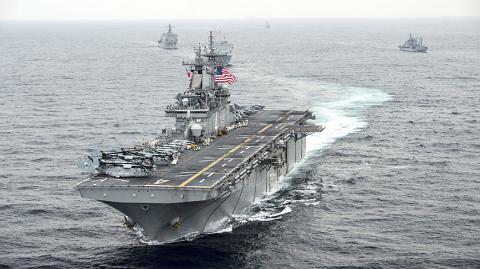Tehran yesterday denied that the US had downed one of its drones, saying all Iranian aircraft were accounted for and jesting that Washington might have accidentally hit its own machine.
The latest incident in the strategic Strait of Hormuz comes amid soaring tensions between the two foes, with Washington already reeling from Iran shooting down one of its drones last month.
US President Donald Trump said that a US naval vessel downed an Iranian drone on Thursday that threatened the ship as it was entering the Strait — a claim vehemently denied by Tehran.

Photo: EPA-EFE
Iran’s armed forces dismissed Trump’s assertion as “baseless and delusional.”
“All of [Iran’s] drones ... have safely returned to their bases,” Iranian armed forces spokesman Brigadier General Abolfazl Shekarchi said.
“There have been no reports of a confrontation with the American USS Boxer” naval vessel, he added.
Trump on Thursday said that the USS Boxer “took defensive action” against an Iranian aircraft as it was “threatening the safety” of the vessel and its crew.
The Pentagon said the ship “was in international waters” when a drone approached.
However, Iranian Deputy Minister of Foreign Affairs Abbas Araghchi said that such an incident had never taken place, saying the Islamic republic had not lost any aircraft.
“I am worried that USS Boxer has shot down their own [drone] by mistake,” Araghchi tweeted yesterday.
The confrontation comes after Tehran shot down a US surveillance drone last month that it said was flying in its airspace, a claim denied by the US.
Trump said he called off retaliatory strikes at the last minute following the incident.
Iran has in turn denied US accusations that it was behind a series of tanker attacks off the United Arab Emirates coast and the Gulf of Oman.
The tanker troubles further intensified on July 4, when Gibraltar detained an Iranian vessel with the help of Britain’s Royal Marines.
US officials believed the tanker was destined for Syria to deliver oil, in contravention of separate sets of EU and US sanctions.
Iran branded the seizure “piracy” and a week later London said that Iranian boats menaced a British tanker in the Gulf before they were driven off by a Royal Navy frigate.
That led to US calls for an international flotilla to escort vessels from Gulf oil fields through the Strait of Hormuz.
The incidents have raised fears of a regional conflict involving the US and its allies in the Gulf region, through which nearly one-third of the world’s oil is transported.
The top commander of the Iranian Revolutionary Guards said it was not seeking to “initiate a war,” but would respond to hostilities.
“If enemies make a mistake in calculation, our defensive strategy and all our capacities will change to offensive,” General Hossein Salami said.
His comments came after the Guards on Thursday said that they had seized a “foreign tanker” believed to be the Panamanian-flagged vessel Riah and its crew.
The Revolutionary Guards accused the ship of smuggling Iranian fuel.

MAKING WAVES: China’s maritime militia could become a nontraditional threat in war, clogging up shipping lanes to prevent US or Japanese intervention, a report said About 1,900 Chinese ships flying flags of convenience and fishing vessels that participated in China’s military exercises around Taiwan last month and in January last year have been listed for monitoring, Coast Guard Administration (CGA) Deputy Director-General Hsieh Ching-chin (謝慶欽) said yesterday. Following amendments to the Commercial Port Act (商港法) and the Law of Ships (船舶法) last month, the CGA can designate possible berthing areas or deny ports of call for vessels suspected of loitering around areas where undersea cables can be accessed, Oceans Affairs Council Minister Kuan Bi-ling (管碧玲) said. The list of suspected ships, originally 300, had risen to about

DAREDEVIL: Honnold said it had always been a dream of his to climb Taipei 101, while a Netflix producer said the skyscraper was ‘a real icon of this country’ US climber Alex Honnold yesterday took on Taiwan’s tallest building, becoming the first person to scale Taipei 101 without a rope, harness or safety net. Hundreds of spectators gathered at the base of the 101-story skyscraper to watch Honnold, 40, embark on his daredevil feat, which was also broadcast live on Netflix. Dressed in a red T-shirt and yellow custom-made climbing shoes, Honnold swiftly moved up the southeast face of the glass and steel building. At one point, he stepped onto a platform midway up to wave down at fans and onlookers who were taking photos. People watching from inside

Japan’s strategic alliance with the US would collapse if Tokyo were to turn away from a conflict in Taiwan, Japanese Prime Minister Sanae Takaichi said yesterday, but distanced herself from previous comments that suggested a possible military response in such an event. Takaichi expressed her latest views on a nationally broadcast TV program late on Monday, where an opposition party leader criticized her for igniting tensions with China with the earlier remarks. Ties between Japan and China have sunk to the worst level in years after Takaichi said in November that a hypothetical Chinese attack on Taiwan could bring about a Japanese

The WHO ignored early COVID-19 warnings from Taiwan, US Deputy Secretary of Health and Human Services Jim O’Neill said on Friday, as part of justification for Washington withdrawing from the global health body. US Secretary of State Marco Rubio on Thursday said that the US was pulling out of the UN agency, as it failed to fulfill its responsibilities during the COVID-19 pandemic. The WHO “ignored early COVID warnings from Taiwan in 2019 by pretending Taiwan did not exist, O’Neill wrote on X on Friday, Taiwan time. “It ignored rigorous science and promoted lockdowns.” The US will “continue international coordination on infectious